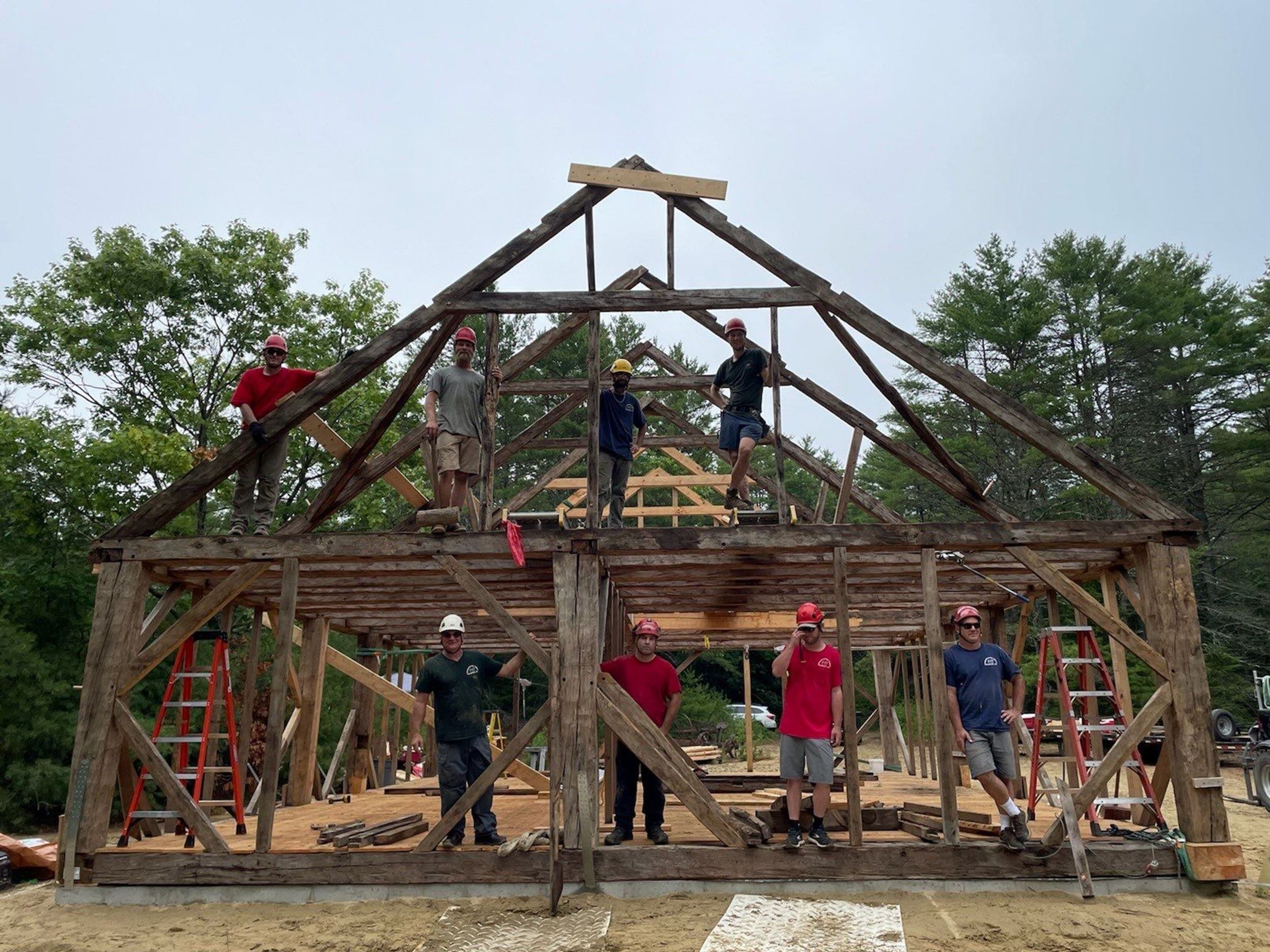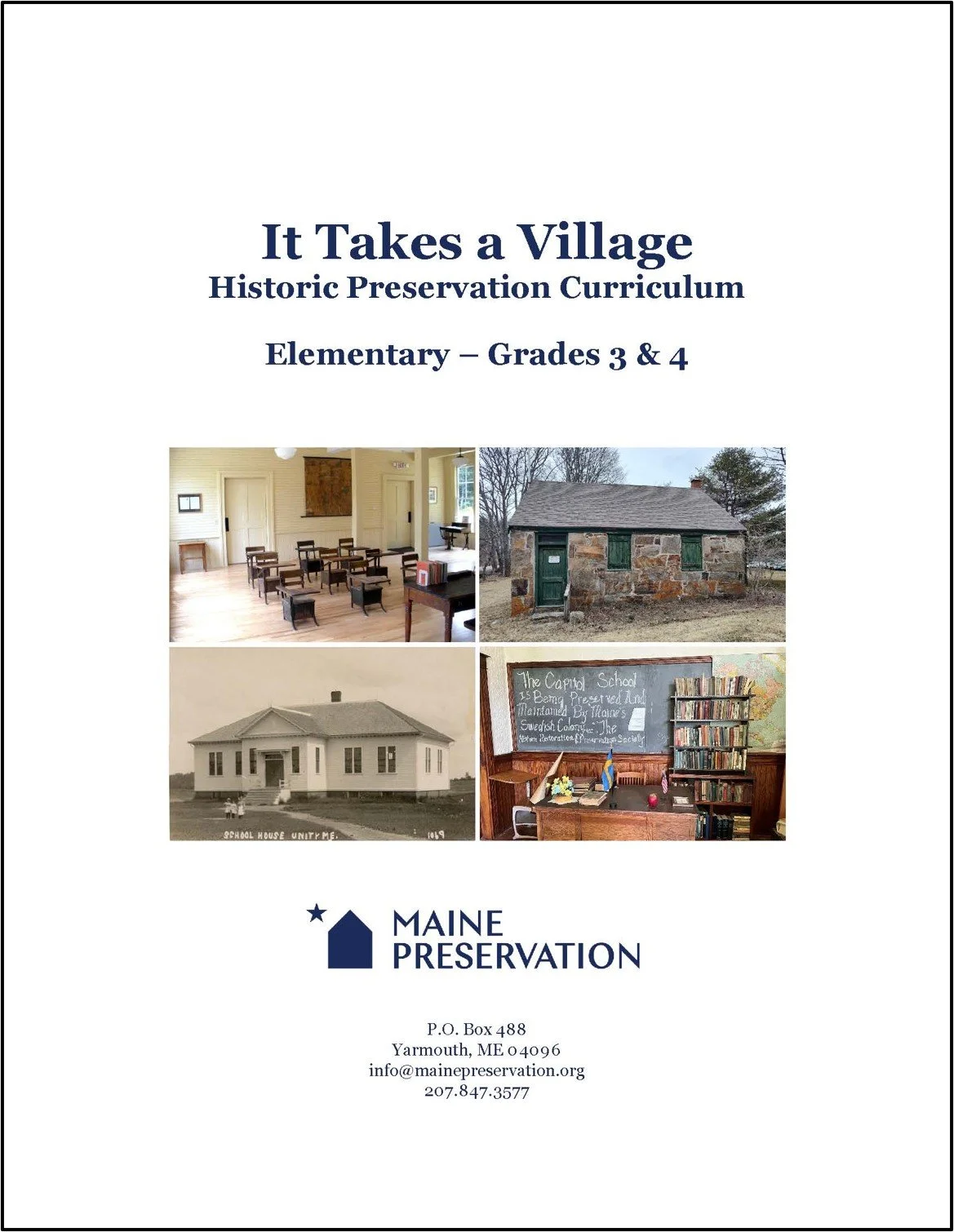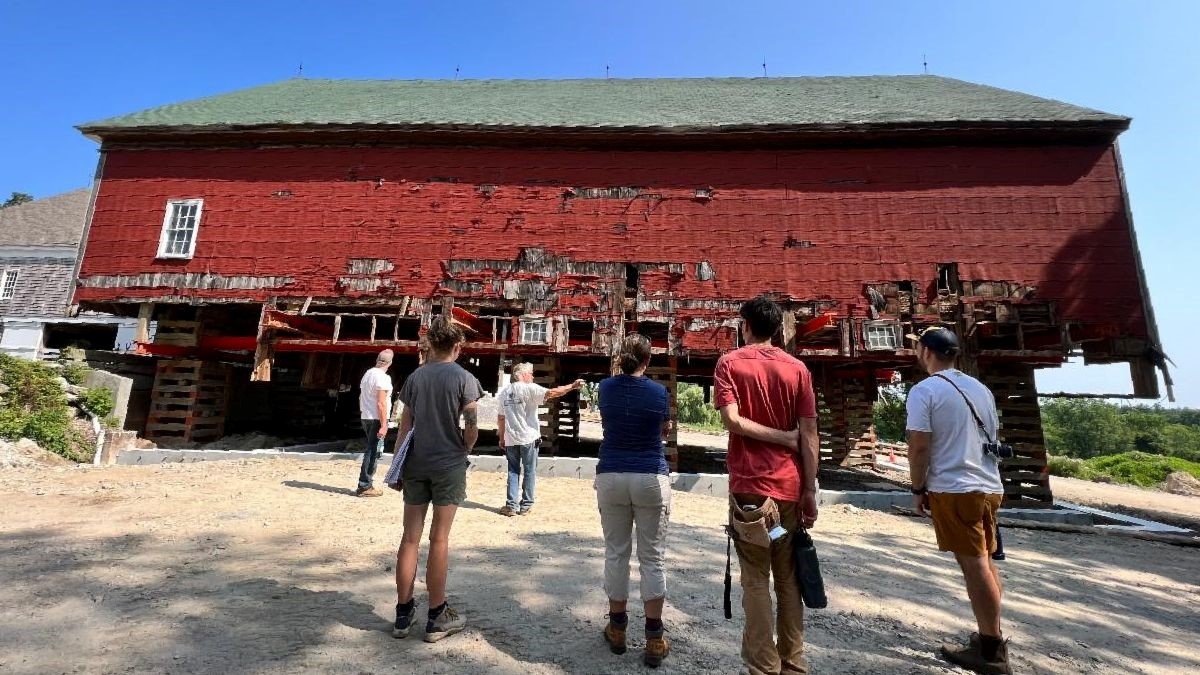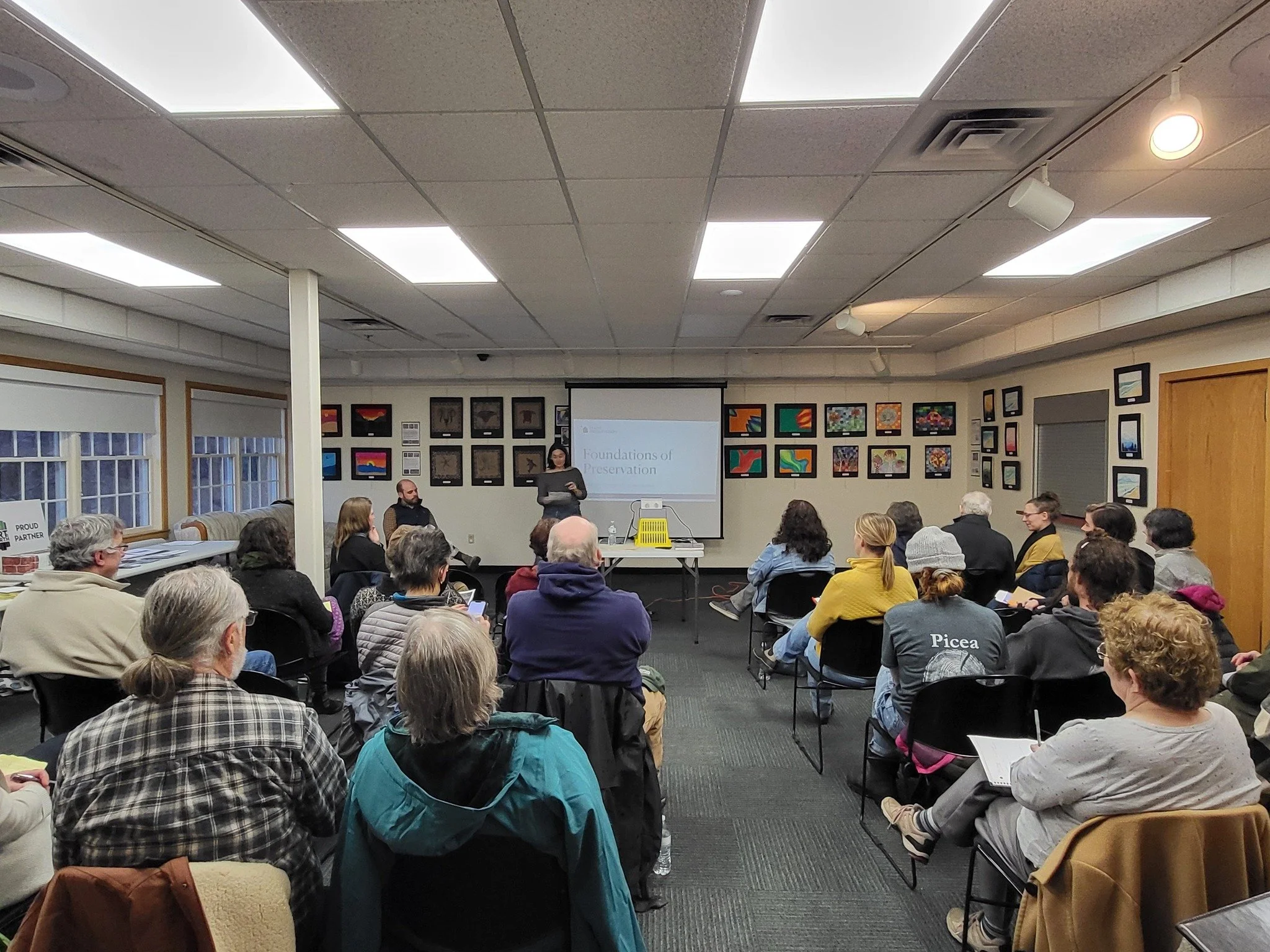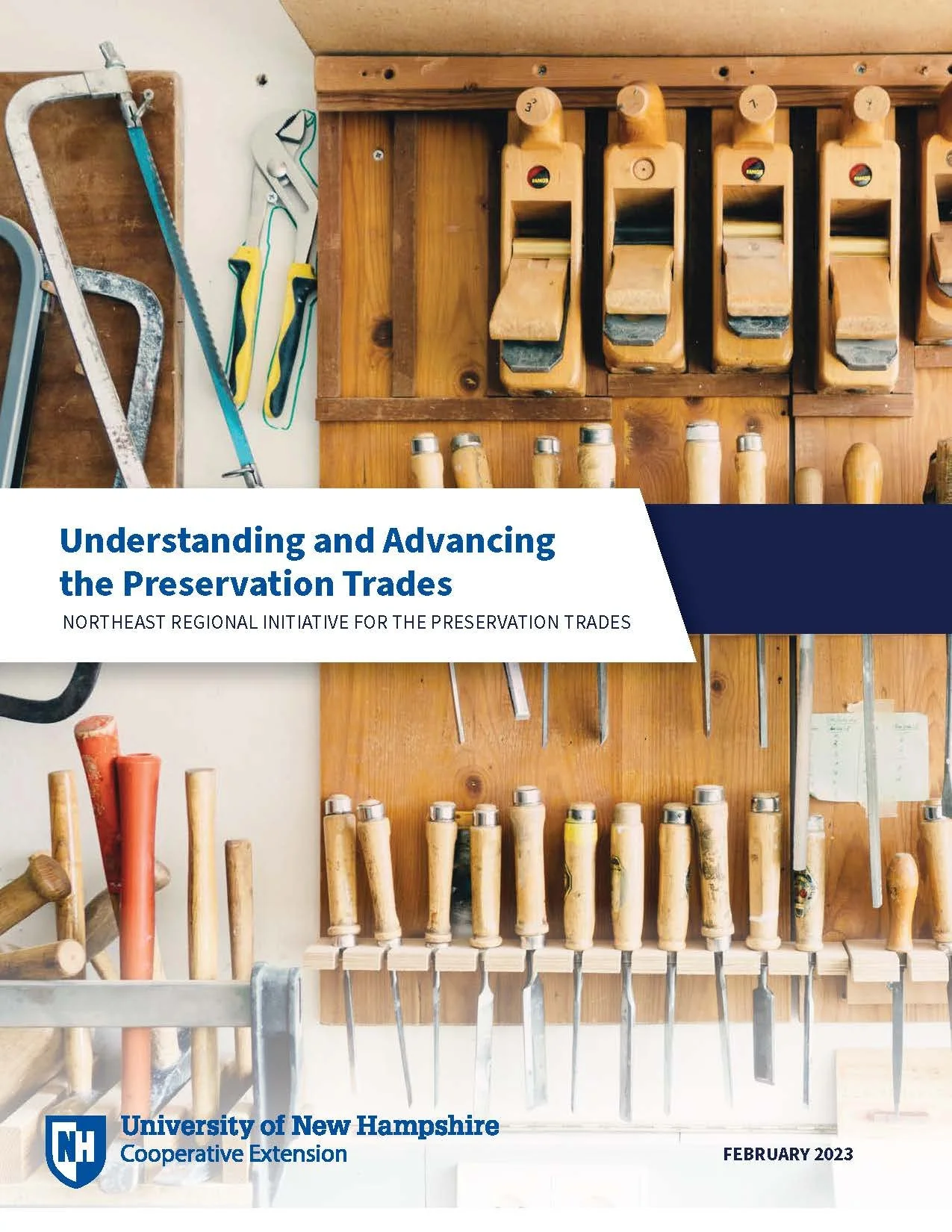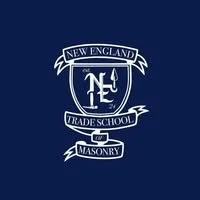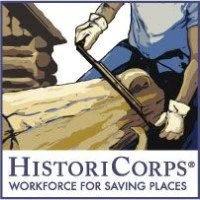Your Future in Preservation
Education Resource Hub
Preservation is powered by people. Are you ready to help push the movement forward?
From community organizers and city planners to masons and window restorers, the movement to steward our sense of place and maintain the built environment is the result of the hard work of both professionals and volunteers. But how did they end up advocating for a historic district or glazing a window? Who taught them? And are they getting paid to do this work?
Photo credit: Preservation Timber Framing
This resource hub is intended to orient those interested in getting involved in preservation and educating the next generation about why preservation may be important to them. Among the resources are curricula and programs developed and delivered by Maine Preservation. They range from scavenger hunts of architectural elements to multi-lesson workshops on the basics of preservation theory, practice, and advocacy. Short descriptions and sample lesson plans are provided, but we encourage contacting our staff to learn more and request complete document packets. Those curious about a career in the historic trades will find more information about our Historic Trades Fellowship, Patricia Anderson Summer Fellowship, low-barrier introductory workshops, traditional schooling, and numerous apprenticeships, mentor programs, and volunteer training opportunities.
table of contents
It Takes a Village - 3rd & 4th Grade Curriculum
If you cannot find what you are looking for or have a suggestion of a resource to add, we want to hear from you!
It Takes a Village - 3rd & 4th Grade Curriculum
Designed for use by schools, homeschool teachers, libraries, local museums, historical societies, and after-school programs, the It Takes a Village historic preservation curriculum creates an engaging and interactive learning experience for elementary school students that aligns with state standards for 3rd and 4th grades. It increases awareness of and appreciation for the built environment and how these historic resources contribute to the vitality and identity of Maine’s communities. The curriculum also improves visual literacy for architectural building types, features, and styles and introduces historic preservation trades and the adaptive reuse of buildings.
The result is a sense of personal investment and community stewardship. The curriculum includes lesson plans, PowerPoint presentations, and supporting materials for five 60-minute learning sessions. Each lesson includes activities such as a neighborhood walk, scavenger hunt, and sketching a building.
Curriculum Outline
Middle School Curriculum
We seek support to develop curriculum that informs middle school-aged youth about the importance of historic buildings and maintaining a sense of place by introducing them to the civic processes and community of people that make preservation happen in villages, towns, and cities, across the state.
High School - Historic Trades Fellowship
The Historic Trades Fellowship exposes high school students (16+) to a valuable and rewarding career in the historic trades, preparing the next generation of Mainers to preserve and rehabilitate our historic built environment. The program centers on a 4-8 week placement with historic trades partners to provide hands-on training, supplemented by weekly sessions on the basics of historic preservation theory and practice with Maine Preservation.
The program was piloted in 2023, with a high school student successfully completing an eight-week placement with Preservation Timber Framing and progressing through supplemental readings, site visits, and learning objectives led by Maine Preservation staff.
Preservation 101
Public workshops
In 2024, Maine Preservation created a series of workshops commissioned by the Heart of Ellsworth with funding from the Hart Family Fund of the National Trust for Historic Preservation. Intended for historic property stewards, the sessions provide an introduction to the history and basics of the field, an overview of financing options for rehabilitation projects, and an explanation of best practices for adapting and updating historic buildings for re-use.
Informational Handouts:
Maine Preservation offers in-person, public workshops for nonprofit organizations and communities for a small fee. Interested in learning more?
Public messaging
Historic preservation can play a role in addressing the urgent issues facing your community, but it is not always easy to show or explain how! The Preservation Priorities Task Force, an initiative of the National Trust for Historic Places and the National Preservation Partners Network (of which MP is a member), created effective infographics that address how preservation can be a tool to address housing affordability; diversity, inclusion and racial justice; workforce development; and climate action.
The infographics are free for all to use and excellent tools for your next presentation at the village improvement society, public comment at a select board meeting, or chat with an owner of a historic building in town
Preservation Trades Training
Understanding & Advancing the Historic trades
In March 2023, Maine Preservation, in collaboration with the New Hampshire Preservation Alliance, Preservation League of New York State, and Preservation Trust of Vermont, released Understanding & Advancing the Historic Trades. The study, conducted by the University of New Hampshire Cooperative Extension, seeks to identify ways to expand education, recruitment, and retention in the preservation trades, while creating a more robust, diverse, and sustainable workforce.
The report found that a growing number of older homes and historic properties are in direct need of repair, maintenance, or rehabilitation but the number of craftspeople who have specialized knowledge in restoration techniques and an in-depth understanding of how to work with traditional materials is dwindling.
95% of survey respondents agreed that preservation trades can provide an interesting, fulfilling, and profitable career path.
96% of respondents were satisfied with their career.
There are severe workforce shortages in plastering, masonry, carpentry, materials conservation, decorative finishes, windows, and iron work.
More than 1/3 of respondents reported that their clients must wait a year or more for their services.
75% of respondents believe the demand for preservation trades is growing.
88% of respondents feel that training programs could play a greater role in recruitment and workforce development.
93% of respondents agree that young people lack knowledge about career possibilities in preservation trades.
The Campaign for Historic Trades
The Campaign serves as the most comprehensive resource for the historic trades, whether you are looking to start your career, grow your career, or mentor and train the next generation. The program is also developing career pathways that effectively explain the various careers within the historic trades, including descriptions of required training and education, a “day in the life of,” and outlooks for employment.
The Campaign for Historic Trades was founded in 2019 as a program of Preservation Maryland and a philanthropic partner of the National Park Service Historic Preservation Training Center.
Patricia Anderson Summer Fellowship (Maine)
Maine Preservation’s fellowship program is dedicated to the professional development of the next generation of preservationists. The program provides a unique and tangible introduction for those recently graduated or currently pursuing a degree or certificate in historic preservation, a related field, or a qualified trades program. Benefits of the fellowship include exposure to the breadth of the preservation field, from construction and repair of structures to the program, policy, and advocacy work of a nonprofit advocacy organization.
North Bennett Street School (Boston, MA)
The North Bennett Street School trains students for careers in traditional trades that use hand skills in concert with evolving technology, to preserve and advance craft traditions, and to promote greater appreciation of craftsmanship. The school’s two-year Preservation Carpentry program includes lectures, hands-on projects, and collaborative field work assisting nonprofit museums and historical sites.
American college of building arts (charleston, sc)
The American College of the Building Arts (ACBA) is the only accredited college in the United States that fully integrates professional training in the traditional building trades with a liberal arts core curriculum. Graduates are not only well-versed in a building arts trade, but they also earn a Bachelor of Applied Science degree, preparing them for the successful real-life application of their trade. Students can pursue one of six specializations: architectural carpentry, blacksmithing, classical architecture & design, plaster, architectural stone, and timber framing. Students are also expected to complete multiple summer externships that gain them real-world experience and can take them anywhere in the world.
New England Trade School of Masonry (Avon, ME)
This traditional trades training program is centered around 1,200 hours (9 months) of hands-on, real word learning. The program efficiently transforms beginners into certified expert masons through training in theory, practical skills, mentorship, and assessments. Tuition includes books and tools, with the option for housing for an additional cost.
Historic PReservation Training Center (USA)
The Historic Preservation Training Center is a program within the National Park Service and is home to the Traditional Trades Advancement Program (TTAP). TTAP places aspiring preservationists with experienced National Park Service employees at national parks across the country to help preserve cultural resources and crucial infrastructure. The full-time, 26-week immersive experience exposes participants to the fundamentals of historic preservation, specifically in traditional trades such as masonry and carpentry.
HistoriCorps (USA)
Founded in 2009, HistoriCorps is a nonprofit organization that provides volunteers of all skill levels with hands-on experience preserving historic structures on public lands across America. Volunteers participate in multi-day, on-site learning opportunities.
timber framers guild (USA)
Founded in 1985, the Timber Framers Guild is a nonprofit educational membership association dedicated to the craft of timber framing. The Guild conducts national and regional conferences, sponsors community building workshops, coordinates regional gatherings, offers professional development and education, and publishes a member magazine and a quarterly journal.
The Guild operates The Heartwood School, an institution in Alstead, New Hampshire, that provides student-centered education, aiming to empower individuals to become skilled builders with a focus on teaching timber framing and related traditional building trades. The school offers single and multi-day courses as well as an annual apprentice program.
Sanborn mills farm (Loudon, NH)
Sanborn Mills Farm is a nonprofit site that teaches traditional crafts, farming with draft animals, and animal husbandry and the skills need to repair, maintain and run water-powered mills and is guided by a desire to achieve perfection through what can be accomplished by working with one’s hands. Workshops in historic trades include decorative plaster and mouldmaking, timber framing, and blacksmithing.
Window Preservation alliance (USA)
The Window Preservation Alliance (WPA) is a trade association of window restorers seeking to change the conversation about window restoration by educating building owners, architects, and others in the construction industry, and to promote career opportunities in window restoration. The WPA runs a mentor program that connects established professionals with emerging window restorers and fledgling restoration companies.
Preservation trades network
The Preservation Trades Network (PTN) is a nonprofit that provides education, networking, and outreach for the traditional building trades. In addition to smaller, site-specific workshops, PTN hosts the International Preservation Trades Workshop, an annual conference that brings together trades practitioners from around the globe. Scholarships are available to underwrite attendance costs for emerging professionals.

